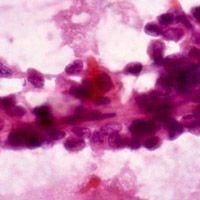Article
Slowing Pancreatic Cancer with Combination Drug Therapy
Author(s):
A combination of two drugs can combat one type of pancreatic cancer, according to a study published in the Journal of the National Cancer Institute.

A combination of two drugs can combat one type of pancreatic cancer, according to a study published in the Journal of the National Cancer Institute.
Researchers from the University of Florida examined the effects of focal adhesion kinase (FAK) in pancreatic neuroendocrine tumors (PanNETs) to demonstrate its efficacy. According to the study, FAK results in the survival of normal pancreatic islets through activation of AKT. The researchers used an existing drug, everolimus, which can extend some patients’ lives by keeping the tumors at bay.
However, everolimus was reported ineffective in many people and often unable to induce regression.
The researchers tested the synthetic, small molecule compound PF 04554787 and determined it “markedly inhibited” the growth of three human pancreatic cell lines after five days of treatment. The synthetic induced the pancreatic cell apoptosis.
The researchers then tested the combination on human pancreatic cells, which had been implanted in mouse models. The volume of tumors decreased by approximately 50% after nearly a month.
The team combined PF 04554787 with everolimus and tested the pairing — the combination was found to be more effective than everolimus alone.
In testing two of the three pancreatic cancer cell lines in mouse models, the synthetic and everolimus combination reduced the viability of cancer cells by about half when compared to tests done on everolimus therapy alone.
“This is important because we’re focused on everolimus, a drug that is already approved, non toxic and given to patients,” study researchers Rony A. François, MD, PhD explained in a press release. “Anything that we can do to make it better represents a big improvement.”
He added that these findings are significant and encouraging because the synthetic compound is already being investigated in human trials.
Innovations toward new therapies for these pancreatic cancers are important because less than 5% of patients with PanNETs respond to everolimus, but it is still the most commonly used pharmaceutical therapy. Furthermore, panNETs are attributed to better diagnostic techniques, an aging population, and heightened awareness.




